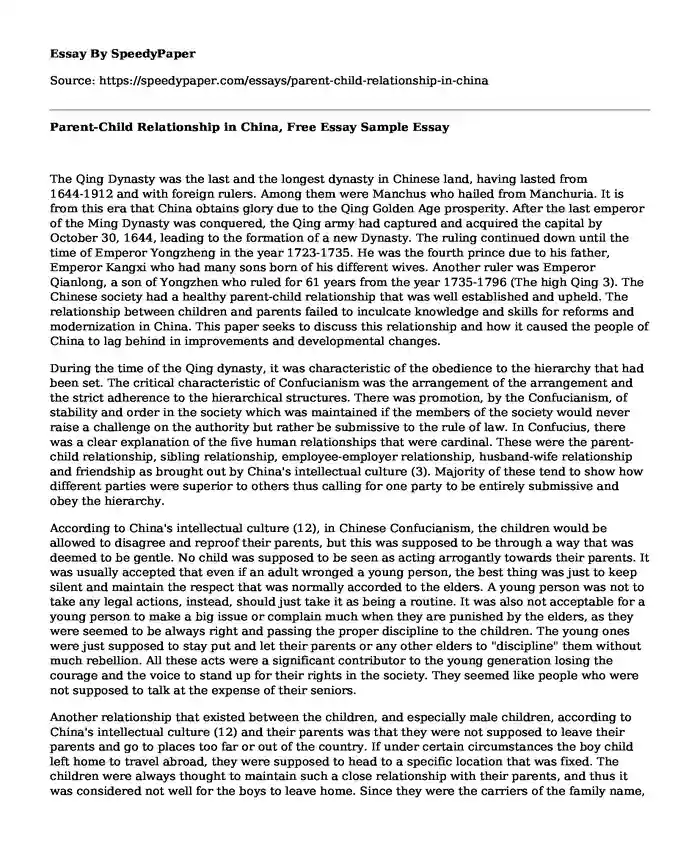The Qing Dynasty was the last and the longest dynasty in Chinese land, having lasted from 1644-1912 and with foreign rulers. Among them were Manchus who hailed from Manchuria. It is from this era that China obtains glory due to the Qing Golden Age prosperity. After the last emperor of the Ming Dynasty was conquered, the Qing army had captured and acquired the capital by October 30, 1644, leading to the formation of a new Dynasty. The ruling continued down until the time of Emperor Yongzheng in the year 1723-1735. He was the fourth prince due to his father, Emperor Kangxi who had many sons born of his different wives. Another ruler was Emperor Qianlong, a son of Yongzhen who ruled for 61 years from the year 1735-1796 (The high Qing 3). The Chinese society had a healthy parent-child relationship that was well established and upheld. The relationship between children and parents failed to inculcate knowledge and skills for reforms and modernization in China. This paper seeks to discuss this relationship and how it caused the people of China to lag behind in improvements and developmental changes.
During the time of the Qing dynasty, it was characteristic of the obedience to the hierarchy that had been set. The critical characteristic of Confucianism was the arrangement of the arrangement and the strict adherence to the hierarchical structures. There was promotion, by the Confucianism, of stability and order in the society which was maintained if the members of the society would never raise a challenge on the authority but rather be submissive to the rule of law. In Confucius, there was a clear explanation of the five human relationships that were cardinal. These were the parent-child relationship, sibling relationship, employee-employer relationship, husband-wife relationship and friendship as brought out by China's intellectual culture (3). Majority of these tend to show how different parties were superior to others thus calling for one party to be entirely submissive and obey the hierarchy.
According to China's intellectual culture (12), in Chinese Confucianism, the children would be allowed to disagree and reproof their parents, but this was supposed to be through a way that was deemed to be gentle. No child was supposed to be seen as acting arrogantly towards their parents. It was usually accepted that even if an adult wronged a young person, the best thing was just to keep silent and maintain the respect that was normally accorded to the elders. A young person was not to take any legal actions, instead, should just take it as being a routine. It was also not acceptable for a young person to make a big issue or complain much when they are punished by the elders, as they were seemed to be always right and passing the proper discipline to the children. The young ones were just supposed to stay put and let their parents or any other elders to "discipline" them without much rebellion. All these acts were a significant contributor to the young generation losing the courage and the voice to stand up for their rights in the society. They seemed like people who were not supposed to talk at the expense of their seniors.
Another relationship that existed between the children, and especially male children, according to China's intellectual culture (12) and their parents was that they were not supposed to leave their parents and go to places too far or out of the country. If under certain circumstances the boy child left home to travel abroad, they were supposed to head to a specific location that was fixed. The children were always thought to maintain such a close relationship with their parents, and thus it was considered not well for the boys to leave home. Since they were the carriers of the family name, they had a responsibility of always being left at home to take care of the family needs and other home duties that a man, who is the head of the house was supposed to be dealing with. To the boy child, having to stay at one localized place limited their thoughts and the exposure to the outside world thus making them unable to deal with the real challenges that needed scientific or critical thinking to solve problems. Since one was always to be at home, them, they lacked the knowledge of solving problems and societal needs such as new methods of crop cultivation, animal crossbreeding and environmental conservation. It was another factor that contributed to the derailment of China to develop in these early days.
In conclusion, the Chinese Confucianism was a tradition of the early Chinese Dynasty that encouraged many virtues among the people in the society. This method advocated for the maintenance of close relationships between the different social classes in the community. The children were always encouraged to be submissive to the elders. Despite this being a positive culture being inculcated in the young generation, it limited the scope of thinking in the young people, which prevented them from visualizing the world beyond their set boundaries of submission. All these factors thus contributed to the slow development of the Chinese people in the early years.
Works cited
China's Intellectual Culture and the Confucian Legacy
The High Qing: Yong Zheng and Qianlong
Cite this page
Parent-Child Relationship in China, Free Essay Sample. (2022, Mar 15). Retrieved from https://speedypaper.com/essays/parent-child-relationship-in-china
Request Removal
If you are the original author of this essay and no longer wish to have it published on the SpeedyPaper website, please click below to request its removal:
- Free Essay Describing the Social Media Campaign for Jewellery Box UK
- Banning Guns Would Be Bad for the Economy - Gun Control Essay Sample
- FDA Regulations, Food Safety Essay Sample
- World Health Symposium Analysis - Essay Sample
- Biography of Florence Nightingale
- Essay Sample: Analyzing and Discussing the Payer Mix for APN Release
- Free Essay - Thomas Hobbes and Religion/Politics
Popular categories





